# telecom
Explore tagged Tumblr posts
Text

The first mobile phone call was made on this day in 1973. Martin Cooper, using a prototype of the Motorola DynaTAC, placed a call from the streets of New York to Bell Labs in New Jersey. The device was 9 inches tall, had a talk-time of 35 minutes, and took 10 hours to recharge.
6K notes
·
View notes
Text
Doublethink sump linkdump
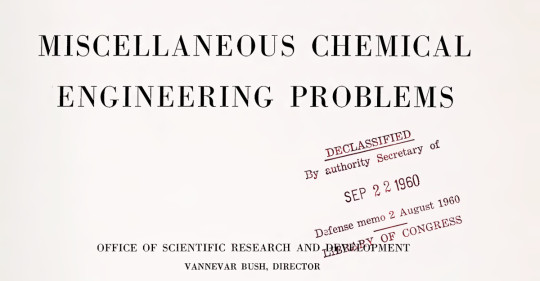
On OCTOBER 23 at 7PM, I'll be in DECATUR, presenting my novel THE BEZZLE at EAGLE EYE BOOKS.

Trigger warning for #eikositriophobia: this is my 23d linkdump (Hail Discordia!), an erratic Saturday purge of the open tabs I haven't managed to blog this week; here's the previous 22:
https://pluralistic.net/tag/linkdump/
When I was a kid, I idolized Harlan Ellison. I loved his prose styling, his stage presence, the way he blended activism and fiction, and the way he mixed critical nonfiction with fiction. As a 17 year old, I attended a writing workshop that Ann Crispin was giving at a local science fiction convention and she told me that I had the makings of a great writer, just as soon as I stopped trying to be Harlan Ellison.
But Harlan was a complicated figure. I attended the Clarion Workshop in 1992 specifically because he was our instructor, and came away bitterly disillusioned after he targeted one of my fellow students for relentless, cruel bullying, a performance that was so ugly that the board fired the director and permanently barred him from teaching the workshop.
Later on, Harlan became the kind of copyright maximalist who called for arbitrary internet surveillance and censorship in the name of shutting down ebook piracy. During a panel about this at a sf convention, he called one of the other panelists a "motherfucker" and threatened to punch him in the face. He took to badmouthing me in interviews, painting my position – whose nuances he certainly understood – in crude caricature.
But Harlan and I had many friends in common, people I really liked, and they were adamant that Harlan's flaws were not the whole story: if Harlan liked you, he would do anything to stand up for you, no matter the cost to himself. Famously, when Harlan taught Octavia Butler's Clarion, he demanded to know why she wasn't writing full time, and she replied that there was the inconvenient matter of making rent and groceries. He replied, "If that's all that's stopping you, come live in my guest house for as long as it takes, eat my groceries, and write." Which she did.
Which is great, but also: one of my own Clarion students told me about when his then-teenaged mother met Harlan at a sf convention and told him that she dreamed of becoming a writer, and he propositioned her. She was so turned off that she stopped writing forever (her son, my student, is now an accomplished writer).
So Harlan was a mixed bag. He did very, very good things. He did very, very bad things. When Harlan died, in 2018, I wrote an obit where I grappled with these two facts:
https://memex.craphound.com/2018/06/28/rip-harlan-ellison/
In it, I proposed a way of thinking about people that tried to make sense of both Harlans – and of all the people in our lives. There's an unfortunate tendency to think of the people that matter to us as having their deeds recorded in a ledger, with good deeds in one column and wicked deeds down the other.
In this formulation, we add up the good deeds and the bad deeds and subtract the bad from the good. If the result is a positive number, we say the good outweighs the bad, and therefore the person is, on balance, good. On the other hand, if the bad outweighs the good, then the person is bad, and the good deeds are irrelevant.
This gets us into no end of trouble. It means that when someone we admire slips up, we give them a pass, because "they've earned it." And when someone who's hurt us does something selfless and kind and brave, we treat that as though it doesn't matter, because they're an asshole.
But the truth is, no amount of good deeds can wipe away the bad. If you hurt someone, the fact that you've helped someone else doesn't make that hurt any easier to bear. And the kindnesses you do for other people make their lives better, no matter what bad things you've done to others.
Rather than calculating the balance of our goodness or badness, I think we should just, you know, sit with our sins and virtues. Let all the harm and joy exist in a state of superposition. Don't cancel out the harm. Don't wave away the good. They both exist, neither cancels the other, and we should strive to help more, and to do less harm. We should do everything we can to help those we harm. No one owes us a pass because of the good we've done.
That's the lesson Harlan taught me, and he taught it to me by absolutely failing to live his life this way – a fact that exists alongside all of the good he did, including the great art he made, which I love, and which inspired me.
Not long after Harlan's death, I got a phone call from J Michael Straczynski, Harlan's literary executor. As part of his care for Harlan's literary legacy, Joe was editing a new anthology of short stories, The Last Dangerous Visions, and did I want to contribute a story?
https://www.rollingstone.com/culture/culture-features/harlan-ellison-last-dangerous-vision-1235117069/
Of course I did. Harlan edited Dangerous Visions in 1967: a groundbreaking anthology of uncomfortable science fiction that featured everyone from Philip K Dick to Samuel Delany. The followup, 1972's Again, Dangerous Visions, was, if anything, even more influential, including Le Guin's The Word For World IS Forest, as well as work by Joanna Russ, Kurt Vonnegut, David Gerrold, and James Tiptree, Jr.
Though some of the stories in these books haven't aged well, together, they completely changed my view of what science fiction was and what it could be. But The Last Dangerous Visions was a different (ahem) story. For complicated reasons (which all cashed out to "Harlan being very difficult to work with, sometimes for damned good reasons, other times for completely petty ones), TLDV was, at the time of Harlan's death, fifty years behind schedule. It was "science fiction's most famous unpublished book." Harlan had bought early work from writers who had gone on to have major careers – like Bruce Sterling – and had sat on them for half a century.
Then Joe called me to tell me that he was starting over with TLDV and did I want to contribute a story – and of course I did. I wrote a story for him with the title "Jeffty Is Five," part of my series of stories with the same titles as famous works of sf:
https://locusmag.com/2012/05/cory-doctorow-a-prose-by-any-other-name/
Joe liked the story, but not the title. He thought Harlan wouldn't have approved of this kind of appropriation, and he wanted to do right by the memory of his old friend. My first reaction was very Harlan-like: this is supposed to make you mad, it's my art, and if it offends you, that's your problem.
But I remembered the most important lesson I learned from Harlan, about good deeds and bad ones, and I thought about Joe, a writer I admired and liked, who was grappling with his grief and his commitment to Harlan's legacy, and I changed my mind and told him of course I'd change the title. I changed the title because Harlan would never have done so, and that's rather the point of the story.The story is (now)) called "The Weight of a Heart, the Weight of a Feather" (a very Harlanish title), and it's about the legacy of complicated people, whose lives are full of noble selflessness *and careless or deliberate cruelty. It's about throwing away the ledger and just letting all those facts sit together, about lives that are neither washed of sin by virtue, nor washed of virtue by sin.
It's a good story, I think, and I'm proud of it, and I'm interested in what the rest of you think now that the book is out:
https://www.blackstonepublishing.com/products/book-fyhm
Harlan was the writer who made me want to get good at reading my stories aloud. I was a charter member of the Harlan Ellison Record Club, as you can see for yourself from the time Harlan (accidentally) doxed me:
http://harlanellison.com/text/paladin.txt
After nearly 20 years of podcasting, I'm actually pretty good at this stuff. I'm going to be podcasting a reading of this story – eventually. I am nearly done "de-googling" my podcast feed, ripping it out of Feedburner, a service that I started using nearly two decades ago to convert a WordPress RSS feed to a podcast feed. In the intervening years, WordPress has come to support this natively and Feedburner has become a division of Google, so I've been methodically removing Feedburner's hooks from my feed, which is now proudly available here, without any surveillance or analytics:
https://craphound.com/feeds/doctorow_podcast
I'll be writing up the process eventually. In the meantime, I'm about to embark on another podcast fiction project, serializing my novella Spill, a "Little Brother" story that Tor's Reactor just published:
https://reactormag.com/spill-cory-doctorow/
The first part of "Spill" will go out tomorrow or Monday. Reactor also just published another "Little Brother" story, "Vigilant," which I read in last week's podcast:
https://craphound.com/littlebrother/2024/09/29/vigilant-a-little-brother-story/
One of my long-running beefs with Harlan was his insistence that the answer of copyright infringement online was to create an obligation on intermediaries – like ISPs – to censor their users' communications on demand from anyone claiming to have been wronged by a post or upload.
This would be bad for free expression under any circumstances, but it's an especially dangerous vision for ISPs, who are among the worst-run, most venal businesses in modern society ("We don't care, we don't have to, we're the phone company" -L Tomlin).
It's hard to overstate just how terrible ISPs are, but even in a field that includes Charter and Comcast, there's one company that rises above the pack when it comes to being grotesquely, imaginatively awful: Cox Communications.
Here's the latest from Cox: they sell "unlimited" gigabit data plans that cost $100 for the base plan and $50 to add the "unlimited" data. But – as Jon Brodkin writes for Ars Technica – Cox uniquely defines "unlimited" as severely limited:
https://arstechnica.com/tech-policy/2020/06/cox-slows-internet-speeds-in-entire-neighborhoods-to-punish-any-heavy-users/
Now, you're probably thinking, ho-hum, another company that offered unlimited service and then acted like dicks when a customer treated it as unlimited, ::laughs in American Airlines::
https://www.forbes.com/sites/jamesasquith/2019/11/13/unlimited-first-class-flights-for-lifehow-american-airlines-made-the-most-expensive-mistake-in-aviation-history/
But that's not the Cox story! Cox doesn't just throttle "unlimited" customers' internet to 2006-vintage DSL speeds – they slow down the entire neighborhood around the unlimited customer to those speeds.
As Brodkin writes, every Cox customer in the same neighborhood as an "unlimited" customer named "Mike" had their upload speeds reduced by more than two thirds, from 35mbps to 10mbps, to punish Mike. And they're not the only ones!
https://www.reddit.com/r/GNV/comments/gkicjg/comment/fr670cx/
Cox confirmed they were doing this, saying "performance can be improved for all customers in the neighborhood by temporarily increasing or maintaining download speeds and changing upload speeds for some of our service tiers."
Cox has been on a roll lately, really going for the shitty-telecoms-company gold. Back in August, 404 Media published a leaked pitch deck in which Cox promised advertisers that they were secretly listening to their customers' smart devices, transcribing their private conversations, and using them to target ads:
https://www.404media.co/heres-the-pitch-deck-for-active-listening-ad-targeting/
This isn't just appalling, it's also almost certainly fraudulent. As terrible as "smart" devices are (and oh God are they terrible), the vast majority of them don't do this. That's something a lot of security researchers have investigated, doing things like hooking up a protocol analyzer to a LAN with a smart device on it and looking for data transmissions that correspond to ambient speech in earshot of the gadget's mic.
My guess is that Cox has done a deal with a couple of the bottom-feedingest "smart TV" companies (as a cable operator, Cox will have relationships with a lot of these companies) to engage in this conduct. Smart TVs have emerged as one of the worst categories of consumer technology, on every axis: performance, privacy, repairability. The field has raced to the bottom, hit it, and then started digging to find new lows to sink to. This is just my hunch here, but I think it's highly likely that if there's a class of devices that are bugging your living room and selling the data to Cox, it's gonna be a smart TV (top tip: buy a computer monitor instead, and use your phone or laptop to stream to it).
Ask a certain kind of very smooth-brained, Samuelson-pilled economist about the enshittification of smart TVs and they'll tell you that this is a "revealed preference":
https://en.wikipedia.org/wiki/Revealed_preference
As in, sure, you may say that you don't want your TV to secretly record your private conversations and sell them to Cox, but actually you quite like it, because you have a TV.
While this is a facially very stupid argument, it's routinely made by people who think they're very smart, a point famously made by Matt Bors's "Mr Gotcha":
https://thenib.com/mister-gotcha/
Comics turn out to be a very good medium for stringing up the revealed preferences crowd on their own petards. This week, Juan Santapau's "The Secret Knots" added to the Mr Gotcha canon with an equally brilliant webcomic, albeit one with a very different vibe, entitled "Remind Me Later":
https://thesecretknots.com/comic/remind-me-later/
Santapau really catches the zeitgeist with this one, which is more of a slow burn than a zinger, and which shows how online "revealed preferences" nonsense grooms us for the same bullshit in every corner of our lives, even our psychotherapist's office. Highly recommended – an instant classic.
"Revealed preferences" comes from the Chicago School of Economics, a field that decided that a) economics should be a discipline grounded in mathematical models; and b) it was impossible to factor power relationships into these models; so c) power doesn't matter.
Once you understand this fact, everything else snaps into focus – like, why the Chicago School loves monopolies. If you model an economy dominated by monopolists without factoring the power that monopolists wield, then you can very easily assume that any monopoly you discover is the result of a lot of people voluntarily choosing to spend all their money with the company they love best.
The fact that we all hate the monopolists we have to deal with is dismissed by these economists as a mirage: "sure, you say you hate them, but you do business with them, therefore, your 'revealed preference' shows that you actually love them."
Which is how we end up with absolutely outrageous rackets like the scholarly publishing cartel. Scholarly journals acquire academics' work for free; get other academics to edit the work for free; acquire lifetime copyright to those finished works; and charge the institutions that paid those "volunteer" academics salaries millions of dollars to access their publications:
https://pluralistic.net/2024/08/16/the-public-sphere/#not-the-elsevier
These companies don't just lock up knowledge and tie an anchor around the scientists' and scholars' ankles, dragging them down. Their market power means that they can hurt their customers and users in every way, including through rampant privacy violations.
A new study from SPARC investigates the privacy practices of Springerlink, and finds them to be a cesspit of invasive, abusive conduct that would make even a Cox executive blush:
https://zenodo.org/records/13886473
Yes, on the one hand, this isn't surprising. If a company can screw you on pricing, why wouldn't they scruple to give you the shaft on privacy as well? But The fact that a company as terrible as Springer can be the dominant firm in the sector is still shocking, somehow.
But that's terminal-stage capitalism for you. It's not just that bad companies companies thrive – it's that being a bad company is a predictor of sky-high valuations and fawning coverage from the finance press.
Take Openai, a company that the press treats as a heptillion-dollar money-printer whose valuation will eventually exceed the rest of the known universe. Openai has a lot of problems – a mass exodus of key personnel, a product that doesn't work for nearly all the things it's claimed as a solution to – but the biggest one is that it's a bad business.
That's the theme of a fantastic, characteristically scathing-but-deep Ed Zitron article called (what else?) "Openai is a bad business":
https://www.wheresyoured.at/oai-business/
Zitron does something that no one else in the business press does: takes Openai's claims about its business fundamentals – its costs, its prices, its competitors, and even its capabilities – at face value, and then asks, "Even if this is all true, will Openai ever turn a profit?"
The answer is a pretty convincing "no." Zitron calls it a "subprime AI crisis" in a nod to Tim Hwang's must-read 2020 book about the ad-tech bezzle, Subprime Attention Crisis:
https://pluralistic.net/2020/12/06/surveillance-tulip-bulbs/#adtech-bubble
The fascinating thing about both Zitron and Hwang's analysis isn't that there are big companies that suck – it's that they are able to suck up so much money and credulous excitement, despite how badly they suck.
That's where power – the thing that neoliberal economists say doesn't matter – comes in. Monopoly power is a self-accelerating flywheel, as Amazon's famous investor pitch explains:
https://vimeo.com/739486256/00a0a7379a
Once a monopolist or a cartel wields market power, they can continue to dominate a sector, even though they're very bad – and even if they use their power to rip off both their customers and very powerful suppliers.
That's the lesson of Michael Jordan's lawsuit against NASCAR, as Matt Stoller explains in his latest BIG newsletter:
https://www.thebignewsletter.com/p/michael-jordan-anti-monopolist
Jordan is one of the most famous basketball players, but after retiring from the game, he became a NASCAR owner, and as such, has been embroiled in a monopoly whose abuses are both eerily familiar to anyone who pays attention to, say the pharmacy benefit manager racket:
https://pluralistic.net/2024/09/23/shield-of-boringness/#some-men-rob-you-with-a-fountain-pen
But on the other hand, the fact this is all happening to race-cars and not pharmacies makes it very weird indeed. As with, say, PBMs, NASCAR's monopoly isn't just victimizing the individuals who watch racing, but also the racecar teams. These teams are owned by rich, powerful people (like Jordan), but are "almost always on the verge of bankruptcy."
Why is that? NASCAR rips them off. For example, teams have to buy all their parts from NASCAR, at huge markups, and the purchase contract prohibits them from racing at any rival event. There are a million petty schemes like this, and NASCAR carefully titrates its bleed-off to leave its victims almost at death's door, but still (barely) solvent enough to keep racing.
NASCAR also bought out all the rival leagues, and most of the tracks, and then locked the remaining tracks to exclusivity deals. Then the teams all had to sign noncompetes as a condition of competing in NASCAR, the only game in town – forever.
Hence Michael Jordan, a person who steadfastly refused to involve himself in politics during his basketball career, becoming a firebreathing trustbuster. Stoller cites Jordan's transformation as reason to believe that the anti-monopoly agenda will survive even in the event that Harris wins but bows to corporate donors who insist on purging the Biden administration's trustbusters.
That's a hopeful note, and I'd add my own to it: the fact that the NASCAR scam is so similar to the pharma swindles, academic publishing swindles, and all the other monopoly rip-offs means that there is a potential class alliance between university professors, NASCAR owners, and people with chronic health conditions and big pharmaceutical bills.
That high note brings me to the end of this week's linkdump! And here's a little dessert in case you've got room for one more little link: Kitowares "Medieval Mules", a forthcoming clog styled as trompe l'oeil plate armor:
https://www.kitowares.la/
Pair with old favorites like lycra armor leggings:
https://loricaclothing.com/collections/leggings-1/products/the-augsburg-legging
And a DIY crotcheted knight's helmet:
https://www.etsy.com/listing/590854477/knights-helmet-w-detachable-visor

Tor Books as just published two new, free LITTLE BROTHER s tories: VIGILANT, about creepy surveillance in distance education; a nd SPILL, about oil pipelines and indigenous landback.


If you'd like an essay-formatted version of this post to read or share, here's a link to it on pluralistic.net, my surveillance-free, ad-free, tracker-free blog:
https://pluralistic.net/2024/10/05/farrago/#jeffty-is-five
#pluralistic#linkdump#linkdumps#open access#academic publishing#publishing#monopolies#springer#springer verlag#academia#libraries#glam#cox#collective punishment#ISP#telecoms#cox communications#openai#bubbles#bubblenomics#ed zitron#nascar#michael jordan#car racing#racing#shoes#fashion#medieval mules#harlan ellison#jms
174 notes
·
View notes
Text


Vysílač Hády
-L.F.
261 notes
·
View notes
Text






A false calm was sweeping over the city. Everyone knew it wouldn't last, but they try to enjoy it as much as they can.
First // Prev // Next
#dreamwastaken#sapnap#badboyhalo#awesamdude#my art#dreamblr#white.dragon.au.art#white.dragon.au#do let me know if the dialogue is too small to read!#does this also count as#dtblr#technically yeah!#also the intercom = telecom#I meant to say telecom but im too tired to fix it.
183 notes
·
View notes
Note
What is your opinion on them... I'm Curious..


I think they're pretty :-) .
62 notes
·
View notes
Text
A British telecom company has made a generative AI bot that takes calls from scammers while impersonating a baffled old grandmother that tells meandering stories and goes on weird tangents to waste the scammers' time while also recording everything to get information on their operations.
This is, in a word, awesome.
54 notes
·
View notes
Text

UK 1998
101 notes
·
View notes
Text


An English telephone box painted green to blend in with the scenery.
#Green phone box#Fangdale Beck#Bilsdale#North Yorkshire#British Telecom#daffodils#springtime#scenic beauty#UK
75 notes
·
View notes
Text

407 notes
·
View notes
Text
modern AU of The Terror where a US tech monopoly is trying to lay its own undersea cables through the melting Arctic. is this anything.
129 notes
·
View notes
Text


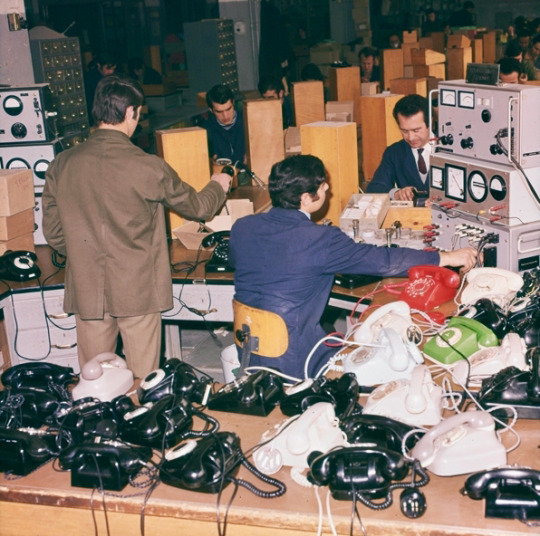


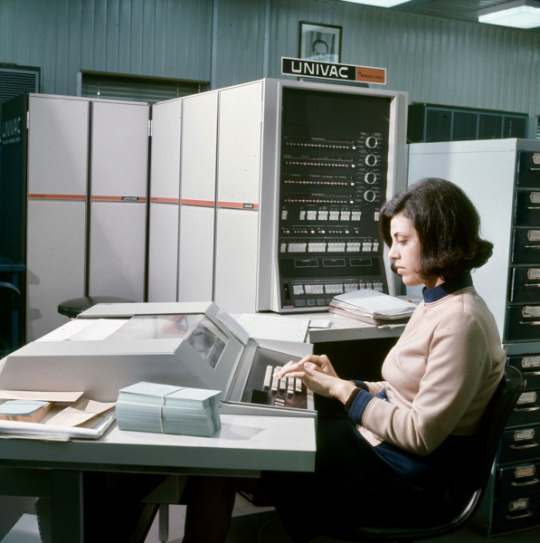

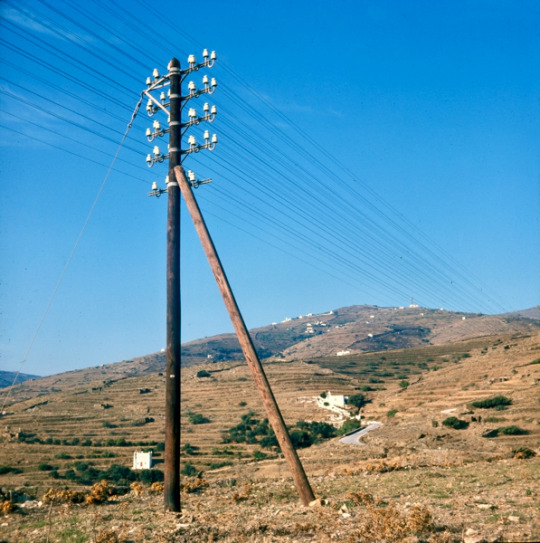


Telecommunications in Greece, 1970-1979.
(OTE Museum of Telecommunications)
1K notes
·
View notes
Text

Chinatsu Kano
Official Art for ティーンエイジブルー (Teenage Blue) by Eve
#curators on tumblr#ao no hako#blue box#eve#teenage blue#ティーンエイジブルー#chinatsu kano#kano chinatsu#telecom animation film#manga#anime#anime manga#official art#anime daily#daily anime#manga daily#daily manga#animedaily#art#artwork#anime art#animanga#user.roy#userartless#userdabiluna#userkyaa#usermica#usermoh#userrashed#userroh
50 notes
·
View notes
Note
Do you have a favourite rotary telephone?
Excellent question!
Yes, I have a favorite:

The Northern Electric Pyramid phone from about 1935. I had this on my desk at my old job, tied into the telephone system. Its distinctive ring made it really easy to discern if I was the one being called instead of my coworkers. The chrome dial and the area code indicate that this unit came from Canada.
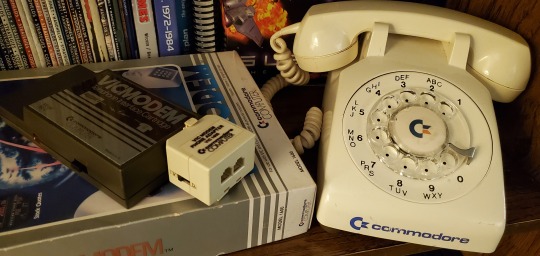
Coming in second place is my Northern Telecom 500-style set with official Commodore branding -- also from Canada. These were sold with VICMODEMs in a special bundle exclusively in the Canadian market. The VICMODEM requires that you detach the cord from the handset, plug it directly into the modem, then dial for the computer.

Problem is that you can't do that here, because the handset cord is permanently attached! Solution? The little white adapter box called the VIC 1605. Very hard to find, but I found one.

Coming in third place would be the Contempra from Northern Electric/Telecom from 1967 (why do these keep being Canadian?). Beautiful colors, angles. Great phone, but sadly I don't have one. Atleast not one like this... NT made these into lineman's test sets (commonly called butt sets because they hang on a lineman's belt by their butt/you use them to butt-in to a call when testing things).


I bought one and turned it into the NT2017 Rotary Cellphone, a real working 2G cellular telephone. It's got an Adafruit Fona board inside with an Atmel 32U4 microcontroller, a little screen, and zero ability to send/receive text messages. It didn't work very well, but it was really fun to build and use before it broke. Construction was very fragile, and my code running it was hot garbage. Since the discontinuation of 2G cell service, it's just decorative at this point.
The last one of my favorites is one I certainly don't have: a late 19th century Skeleton Telephone from Ericsson. Technically not a rotary phone, but it does have a crank that you rotate!

These are expensive, really hard to find, and obviously rather difficult to use without having an operator to ring up when you turn the crank. However, they are stunningly beautiful, and all of the functionality is on display arranged in such a way to accentuate the elegance of its industrial design.
How about you? Do you have a favorite rotary phone?
108 notes
·
View notes
Text

#Rick and Morty: The Anime#Rick Sanchez#Morty Smith#Telecom Animation Film#Studio Deen#Sola Entertainment#Dril#DrilAnime
34 notes
·
View notes
Text
Big Telco’s fury over FCC plan to infuse telecoms policy with facts

I'll be at the Studio City branch of the LA Public Library on Monday, November 13 at 1830hPT to launch my new novel, The Lost Cause. There'll be a reading, a talk, a surprise guest (!!) and a signing, with books on sale. Tell your friends! Come on down!

Reality has a distinct anti-conservative bias, but conservatives have an answer: when the facts don't support your policies, just get different facts. Who needs evidence-based policy when you can have policy-based evidence?
Take gun violence. Conservatives tell us that "an armed society is a polite society," which means that the more guns you have, the less gun violence you'll experience. To prevent reality from unfairly staining this pristine ideological mind-palace with facts, conservatives passed the Dickey Amendment, which had the effect of banning the CDC from gathering stats on American gun-violence. No stats, no violence!
https://en.wikipedia.org/wiki/Dickey_Amendment
Policy-based evidence is at the core of so many cherished conservative beliefs, like the idea that queer people (and not youth pastors) are responsible for the sexual abuse of children, or the idea that minimum wages (and not monopolies) decrease jobs, or the idea that socialized medicine (and not private equity) leads to death panels:
https://pluralistic.net/2023/04/26/death-panels/#what-the-heck-is-going-on-with-CMS
The Biden administration features a sizable cohort of effective regulators, whose job is to gather evidence and then make policy from it:
https://pluralistic.net/2023/10/23/getting-stuff-done/#praxis
Fortunately for conservatives, not every Biden agency is led by competent, honest brokers – the finance wing of the Dems got to foist some of their most ghoulish members upon the American people, including a no-fooling cheerleader for mass foreclosure:
https://pluralistic.net/2023/03/06/personnel-are-policy/#janice-eberly
And these same DINOs reached across the aisle to work with Republicans to keep some of the most competent, principled agency leaders from being seated, like the remarkable Gigi Sohn, targeted by a homophobic smear campaign funded by the telco industry, who feared her presence on the FCC:
https://pluralistic.net/2023/03/19/culture-war-bullshit-stole-your-broadband/
The telcos are old hands at this stuff. Long before the gun control debates, Ma Bell had figured out that a monopoly over Americans' telecoms was a license to print money, and they set to corrupting agencies from the FCC to the DoJ:
https://pluralistic.net/2021/11/14/jam-to-day/
Reality has a vicious anti-telco bias. Think of Net Neutrality, the idea that if you pay an ISP for internet service, they should make a best effort to deliver the data you request, rather than deliberately slowing down your connection in the hopes that you'll seek out data from the company's preferred partners, who've paid a bribe for "premium delivery."
This shouldn't even be up for debate. The idea that your ISP should prioritize its preferred data over your preferred data is as absurd as the idea that a taxi-driver should slow down your rides to any pizzeria except Domino's, which has paid it for "premium service." If your cabbie circled the block twice every time you asked for a ride to Massimo's Pizza, you'd be rightly pissed – and the cab company would be fined.
Back when Ajit Pai was Trump's FCC chairman, he made killing Net Neutrality his top priority. But regulators aren't allowed to act without evidence, so Pai had to seek out as much policy-based evidence as he could. To that end, Pai allowed millions of obviously fake comments to be entered into the docket (comments from dead people, one million comments from @pornhub.com address, comments from sitting Senators who disavowed them, etc). Then Pai actively – and illegally – obstructed the NY Attorney General's investigation into the fraud:
https://pluralistic.net/2021/05/06/boogeration/#pais-lies
The pursuit of policy-based evidence is greatly aided by the absence of real evidence. If you're gonna fill the docket with made-up nonsense, it helps if there's no truthful stuff in there to get in the way. To that end, the FCC has systematically avoided collecting data on American broadband delivery, collecting as little objective data as possible:
https://pluralistic.net/2020/05/26/pandemic-profiteers/#flying-blind
This willful ignorance was a huge boon to the telcos, who demanded billions in fed subsidies for "underserved areas" and then just blew it on anything they felt like – like the $45 billion of public money they wasted on obsolete copper wiring for rural "broadband" expansion under Trump:
https://pluralistic.net/2022/02/27/all-broadband-politics-are-local/
Like other cherished conservative delusions, the unsupportable fantasy that private industry is better at rolling out broadband is hugely consequential. Before the pandemic, this meant that America – the birthplace of the internet – had the slowest, most expensive internet service of any G8 country. During the lockdown, broadband deserts meant that millions of poor and rural Americans were cut off from employment, education, health care and family:
https://pluralistic.net/2021/02/12/ajit-pai/#pai
Pai's response was to commit another $8 billion in public funds to broadband expansion, but without any idea of where the broadband deserts were – just handing more money over to monopoly telcos to spend as they see fit, with zero accountability:
https://pluralistic.net/2020/05/26/pandemic-profiteers/#flying-blind
All that changed after the 2020 election. Pai was removed from office (and immediately blocked me on Twitter) (oh, diddums), and his successor, Biden FCC chair Jessic Rosenworcel, started gathering evidence, soliciting your broadband complaints:
https://pluralistic.net/2021/03/23/parliament-of-landlords/#fcc
And even better, your broadband speed measurements:
https://pluralistic.net/2021/04/14/for-sale-green-indulgences/#fly-my-pretties
All that evidence spurred Congress to act. In 2021, Congress ordered the FCC to investigate and punish discrimination in internet service provision, "based on income level, race, ethnicity, color, religion, or national origin":
https://www.congress.gov/117/plaws/publ58/PLAW-117publ58.pdf
In other words, Congress ordered the FCC to crack down on "digital redlining." That's when historic patterns of underinvestment in majority Black neighborhoods and other underserved communities create broadband deserts, where internet service is slower and more expensive than service literally across the street:
https://pluralistic.net/2021/06/10/flicc/#digital-divide
FCC Chair Rosenworcel has published the agency's plan for fulfilling this obligation. It's pretty straightforward: they're going to collect data on pricing, speed and other key service factors, and punish companies that practice discrimination:
https://www.fcc.gov/document/preventing-digital-discrimination-broadband-internet-access
This has provoked howls of protests from the ISP cartel, their lobbying org, and their Republican pals on the FCC. Writing for Ars Technica, Jon Brodkin rounds up a selection of these objections:
https://arstechnica.com/tech-policy/2023/11/internet-providers-say-the-fcc-should-not-investigate-broadband-prices/
There's GOP FCC Commissioner Brendan Carr, with a Steve Bannon-seque condemnation of "the administrative state [taking] effective control of all Internet services and infrastructure in the US. He's especially pissed that the FCC is going to regulate big landlords who force all their tenants to get slow, expensive from ISPs who offer kickbacks to landlords:
https://www.fcc.gov/document/carr-opposes-bidens-internet-plan
The response from telco lobbyists NCTA is particularly, nakedly absurd: they demand that the FCC exempt price from consideration of whether an ISP is practicing discrimination, calling prices a "non-technical aspect of broadband service":
https://www.fcc.gov/ecfs/document/110897268295/1
I mean, sure – it's easy to prove that an ISP doesn't discriminate against customers if you don't ask how much they charge! "Sure, you live in a historically underserved neighborhood, but technically we'll give you a 100mb fiber connection, provided you give us $20m to install it."
This is a profoundly stupid demand, but that didn't stop the wireless lobbying org CTIA from chiming in with the same talking points, demanding that the FCC drop plans to collect data on "pricing, deposits, discounts, and data caps," evaluation of price is unnecessary in the competitive wireless marketplace":
https://www.fcc.gov/ecfs/document/1107735021925/1
Individual cartel members weighed in as well, with AT&T and Verizon threatening to sue over the rules, joined by yet another lobbying group, USTelecom:
https://www.fcc.gov/ecfs/document/1103655327582/1
The next step in this playbook is whipping up the low-information base by calling this "socialism" and mobilizing some of the worst-served, most-gouged people in America to shoot themselves in the face (again), to own the libs:
https://pluralistic.net/2022/12/15/useful-idiotsuseful-idiots/#unrequited-love

If you'd like an essay-formatted version of this post to read or share, here's a link to it on pluralistic.net, my surveillance-free, ad-free, tracker-free blog:
https://pluralistic.net/2023/11/10/digital-redlining/#stop-confusing-the-issue-with-relevant-facts

Image: Japanexperterna.se (modified) https://www.flickr.com/photos/japanexperterna/15251188384/
CC BY-SA 2.0: https://creativecommons.org/licenses/by-sa/2.0/
--
Mike Mozart (modified) https://www.flickr.com/photos/jeepersmedia/14325839070/
https://www.flickr.com/photos/jeepersmedia/14325905568/
https://www.flickr.com/photos/jeepersmedia/14489390566/
www.ccPixs.com https://www.flickr.com/photos/86530412@N02/8210762750/
CC BY 2.0 https://creativecommons.org/licenses/by/2.0/
#pluralistic#reality-based community#willful ignorance#digital redlining#telecoms#isps#cable company fuckery#net neutrality#network neutrality#fcc#monopolies#market failures#musketfuckers#ammosexuals#guns#race#reality has an anti-conservative bias#dickey amendment#policy based evidence#facts don't care about your feelings
137 notes
·
View notes
Text
Canada’s Big 3 telecommunications companies say they’ve already taken action to reduce the cost of international roaming and plan to introduce more options for customers next year.
Bell Canada says it intends to give customers more flexibility when travelling abroad through options “tailored to their usage and travel duration, ultimately lowering their roaming fees,” starting in early 2025.
Last month, the CRTC called on Bell, Rogers Communications Inc. and Telus Corp. to detail the “concrete steps” they are taking to respond to concerns about rising cellphone fees that consumers face when travelling outside Canada.
Continue reading
Tagging: @newsfromstolenland
20 notes
·
View notes